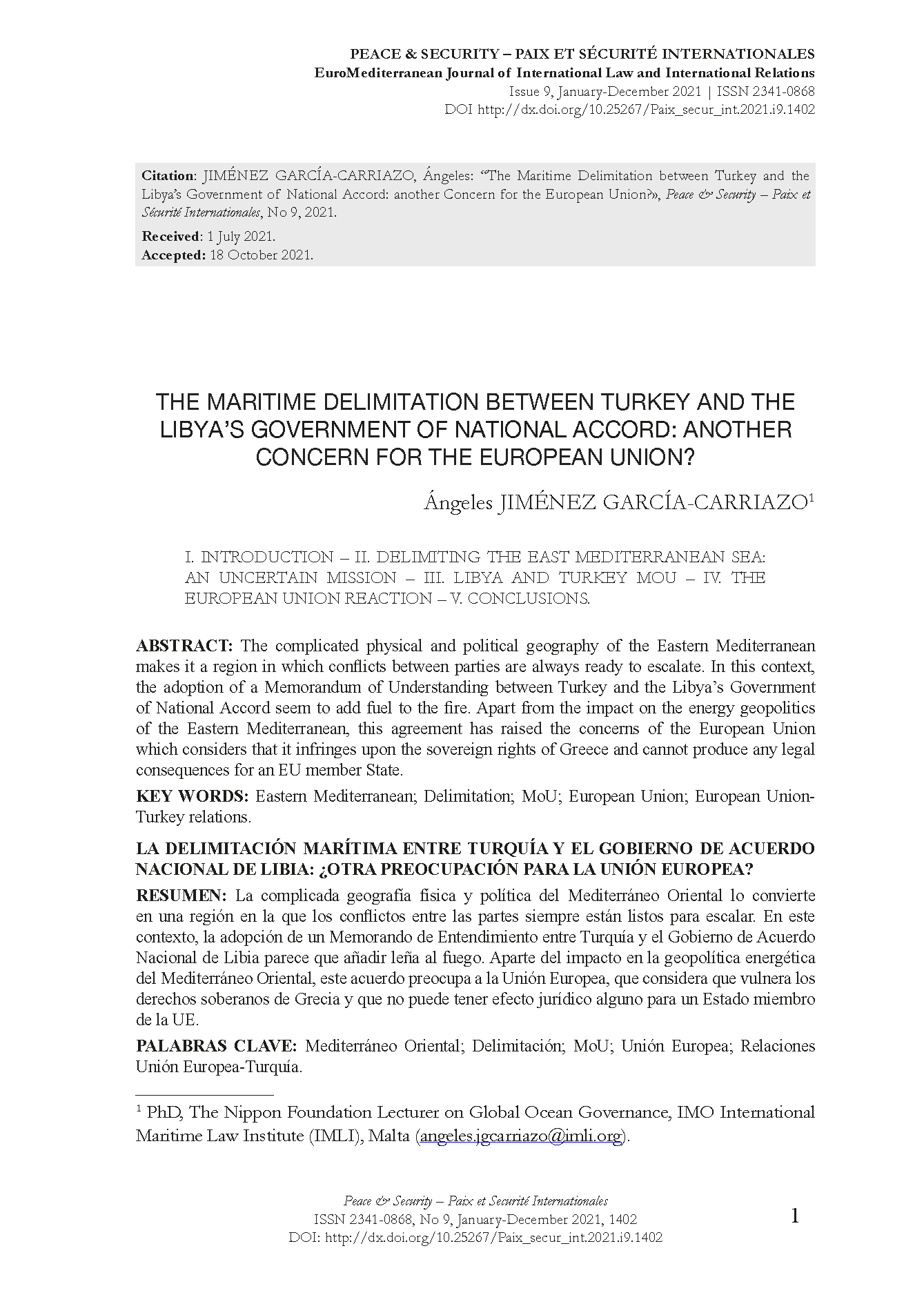The Maritime Delimitation between Turkey and the Libya’s Government of National Accord: another Concern for the European Union?
Abstract
The complicated physical and political geography of the Eastern Mediterranean makes it a region in which conflicts between parties are always ready to escalate. In this context, the adoption of a Memorandum of Understanding between Turkey and the Libya’s Government of National Accord seem to add fuel to the fire. Apart from the impact on the energy geopolitics of the Eastern Mediterranean, this agreement has raised the concerns of the European Union which considers that it infringes upon the sovereign rights of Greece and cannot produce any legal consequences for an EU member State.
Keywords
Downloads
How to Cite
License

This work is licensed under a Creative Commons Attribution-NonCommercial 4.0 International License.
Copyright
Es condición para la publicación que el autor o autores ceda(n) a la Revista, en exclusiva, los derechos de reproducción. Paix et Sécurité Internationales es una revista que proporciona un acceso abierto inmediato a su contenido totalmente gratuito para lectores como para los investigadores que pretendan publicar en ella, ya que no se realizan cobros por concepto de envío, procesamiento ni publicación. Los usuarios podrán leer, descargar, copiar, distribuir, imprimir, buscar o enlazar el texto completo de los artículos publicados, o utilizarlos para cualquier otro propósito, dentro de la legalidad vigente. Y podrán hacerlo sin coste alguno, y sin necesitad de solicitar permiso al editor a al autor. Todo ello de acuerdo con la definición de acceso abierto de la Iniciativa Acceso Abierto de Budapest.
References
ARAB CENTER WASHINGTON DC, “The Libya-Turkey Memorandum of Understanding: Local and Regional Repercussions” http://arabcenterdc.org/policy_analyses/the-libya-turkey-memorandum-of-understanding-local-and-regional-repercussions/.
AXT, H-J., “Troubled Water in the Eastern Mediterranean. Turkey Challenges Greece and Cyprus Regarding Energy Resources”, Comparative Southeast European Studies, vol. 69, no. 1, 2021
BACONI, T., “Pipelines and pipedreams. How the EU can support a regional gas hub in the Eastern Mediterranean”, European Council of Foreign Relations, 2017 https://ecfr.eu/archive/page/-/ECFR211_-_PIPELINES_AND_PIPEDREAMS.pdf.
BAROUDI, R., “Unlocking Peace and Prosperity: How to Resolve Maritime Border Disputes in the Eastern Mediterranean Sea?”, Issam Fares Institute for Public Policy, 2020
BAŞEREN, S.H., Dispute Over Eastern Mediterranean Maritime Jurisdiction Areas, TÜDAV, Istanbul, 2010
BAYAR, G., “Turkey, Libya deal prevents fait accompli in E. Mediterranean”, Anadolu Ajansı, 3 December 2019 https://www.aa.com.tr/en/africa/turkey-libya-deal-prevents-fait-accompli-in-e-mediterranean/1661929.
BICKL, T., “EU v. Turkey in the Eastern Mediterranean: a good moment to sponsor dispute settlement”, The NCLOS Blog, 2020 https://site.uit.no/nclos/2020/09/30/eu-v-turkey-in-the-eastern-mediterranean-a-good-moment-to-sponsor-dispute-settlement/.
BOWLUS, J., “Eastern Mediterranean gas: Testing the field”, European Council on Foreign Relations https://ecfr.eu/special/eastern_med/gas_fields.
CHRYSOPOULOS, P., “US Backs Greece in Dispute Over Turkey-Libya Maritime Deal”, Greek Reporter, 5 June 2020 <https://greekreporter.com/2020/06/05/us-backs-greece-in-dispute-over-turkey-libya-maritime-deal/>
DENIZEAU, A., “Mavi Vatan, the “Blue Homeland”: the Origins, Influences and Limits of an Ambitious Doctrine for Turkey”, Etudes de l’Ifri, Ifri, 202
GAVOUNELI, M., “Whose Sea? A Greek International Law Perspective on the Greek-Turkish Disputes”, Institut Montaigne, 2020 https://www.institutmontaigne.org/en/blog/whose-sea-greek-international-law-perspective-greek-turkish-disputes.
GEORGOPOULOS, A., “Delimitation of the Continental Shelf in the Aegean Sea”, Fordham International Law Journal, Vol. 12, Issue 1, 1988, pp. 90-126
GOWLLAND-DEBBAS, V., “The Legal Framework of Lebanon’s Maritime Boundaries: The Exclusive Economic Zone and Offshore Hydrocarbon Resources”, Association Suisse pour le Dialogue Euro-Arabo-Musulman, 2012
GUNAVAN, Y. et al.: “The validity of Turkey-Libya´s Agreement on maritime boundaries in International Law”, Jurnal Hukum Dan Peradilan, 9 (2), pp. 170 – 185
HACAOGLU, S., “Turkey Signals Push for Deal on Maritime Boundary with Egypt”, Bloomberg, 3 March 2021, https://www.bloomberg.com/news/articles/2021-03-03/turkey-signals-push-for-deal-on-maritime-boundary-with-egypt.
IOANNIDES, N., “The maritime dispute between Cyprus and Turkey in the Eastern Mediterranean Sea”, Eastern Mediterranean Affairs Magazine, pp. 9-14.
IOANNIDES, N., “Turkish Maritime Claims Offshore Cyprus”, Eastern Mediterranean Policy Note, No. 18, Cyprus Center for European and International Affairs, University of Nicosia, 2017.
JIMÉNEZ GARCÍA-CARRIAZO, Á., “Prospecciones turcas en aguas chipriotas, una nueva dimensión del enfrentamiento”, REDI, Madrid, 2020, pp. 117-136.
KANSU, Z. N., “An Assessment of Eastern Mediterranean Maritime Boundary Delimitation Agreement Between Turkey and Libya”, Science Journal of Turkish Military Academy, 2020, Volume 30, Issue 1, pp. 51-84.
KÖCHLER, H., “Kastellorizo: The Geopolitics of Maritime Boundaries and the Dysfunctionality of the Law of the Sea”, International Progress Organization, 2020.
LINDENSTRAUSS, G., FEUER, S., WINTER, O., “The Perils of the Turkey-Libya Maritime Delimitation Deal”, INSS Insight, No. 1238, 2019.
MARGHÉLIS, A., “Les délimitations maritimes Turquie-gouvernement d’entente nationale libyen et Grèce-Égypte dans leur contexte régional”, Neptunus, Vol. 27, 2021/2.
MARGHÉLIS, A., “The maritime delimitation agreement between Greece and Italy of 9 June 2020: An analysis in the light of International Law, national interest and regional politics”, Marine Policy 126, 2021.
NORRIS, A., “Troubled Waters in the Eastern Mediterranean”, EJIL: Talk https://www.ejiltalk.org/troubled-waters-in-the-eastern-mediterranean/.
PEDERSEN, G.F., “The Implications of a Maritime Delimitation Agreement between Turkey and Egypt”, iGlobeNews, 12 May 2021 https://www.iglobenews.org/the-implications-of-a-maritime-delimitation-agreement-between-turkey-and-egypt/.
SOLER i LECHA, E., “The EU and the Eastern Mediterranean: how to deal with Turkey”, CIDOB notes internationals, 251, 2021.
STANICEK, B., “Turkey: Remodelling the Eastern Mediterranean”, European Parliament Brief, 2020.
SUKKARIEH, M., “The East Mediterranean Gas Forum: Regional Cooperation Amid Conflicting Interests”, NRGI, 2020.
TALMON, S., LOBO, M., “The Intricacies of Maritime Boundary Delimitation: Germany’s One-Sided Response to the Turkey-Libya MoU on Delimitation of the Maritime Jurisdiction Areas in the Mediterranean”, https://gpil.jura.uni-bonn.de/2020/03/the-intricacies-of-maritime-boundary-delimitation-germanys-one-sided-response-to-the-turkey-libya-mou-on-delimitation-of-the-maritime-jurisdiction-areas-in-the-mediterranean/.
YIALLOURIDES, C., “Maritime Boundary Delimitation in the Eastern Mediterranean Sea: Progress and Outstanding Legal Issues”, Eastern Mediterranean Affairs Magazine, Issue 2, 2021, pp. 29-28.
YIALLOURIDES, C., “Part I: Some Observations on the Agreement between Greece and Egypt on the Delimitation of the Exclusive Economic Zone”, 2020, EJIL Talk!, https://www.ejiltalk.org/18969-2/.







